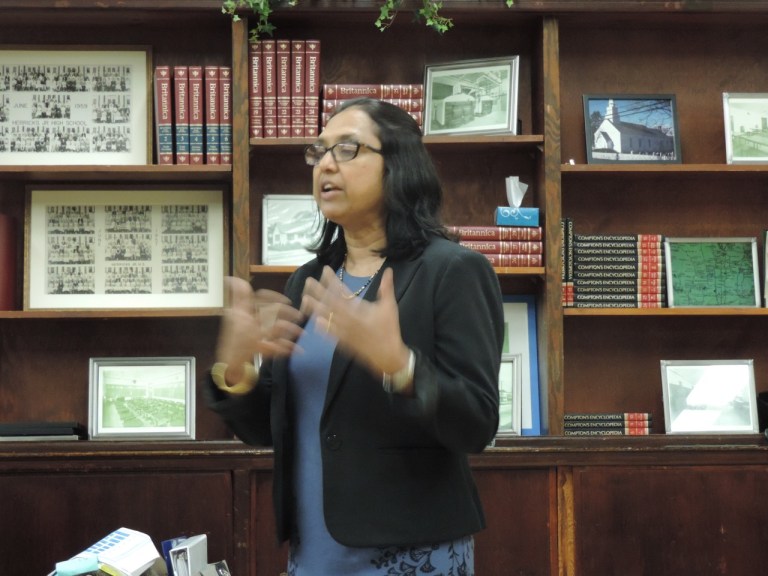
By Samuel Glasser
Herricks students consistently perform well on state mathematics tests and recognize the importance of the subject, but ironically have somewhat low self-confidence when it comes to mastering the subject matter, the district math curriculum director said Thursday.
Geetha Murthy, the director, presented to the school board the findings of a yearlong review of the math curriculum from the elementary grades through high school.
One of the district’s goals is to help students “appreciate the beauty of mathematics” and its relevance across other academic disciplines, she said.
“Teachers are doing a great job incorporating math practices and fostering a growth mindset,” Murthy told the board, with several math teachers and administrators from across the district also in attendance. “The goal is to help all students to excel and enjoy math.”
A surprise revealed during the evaluation was the results of a survey taken among seniors at Herricks High School, Murthy said.
The respondents agreed or strongly agreed — sometimes overwhelmingly so — with statements that math is “very necessary and worthwhile,” “important in everyday life,” that math courses would be “very helpful no matter what I decide to study,” and “I can think of many ways that I use math outside of school.”
This appears to complement the performance of Herricks students on the state assessment tests for fourth through seventh grade where 75 percent or more score at levels rated “proficient” or “above proficient.”
Herricks students also consistently scored well above the Nassau County and statewide averages on the assessment tests and the Regents exams for algebra and geometry.
At the same time, however, the survey showed the students to have considerably less confidence in their ability to learn math easily or come up with solutions to problems on their own.
“Students just feel that math is hard and they’re not good at it,” Murthy said. “It’s a prevailing part of the culture, not just at our school.”
Murthy said she frequently encounters people who “think it’s ok to be not good at math.”
“I was a teacher for 18 years and students would come in on the first day and say, ‘I’m not good at math,’” Murthy recalled.
“Maybe the students are good at math and they don’t know it,” she said.
The way to push back against that attitude, she said, is to provide the opportunities for students to wrestle with problems – “figure it out by themselves and not give up. And once they work through a problem and get it and their confidence improves.”
Murthy said the mindset starts in grades three and four. “That’s where it’s important to have them start believing in their own abilities,” she said.
Murthy said the evaluation team, comprised of teachers and math administrators from the three elementary schools, and the middle and high schools, recommends a revamping of the math honors program for the 2018-19 school year.
It would eliminate the accelerated classes in sixth grade, scale them back in seventh and eighth grades and recalibrate the program in the high school.
Only one third of the students who start honors math in sixth grade see the program through to their senior year, she said. Because the students are pushed to do so much so quickly they lose their love for math, she said.
“They struggle and think ‘I can’t do this,’” Murthy said.






